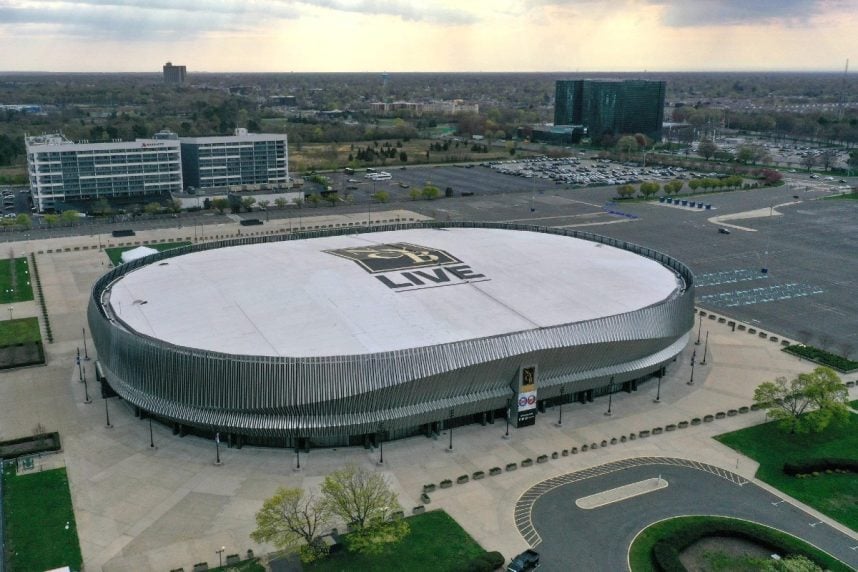Sands’ New York Casino Effort Suffers Legal Setback
Posted on: February 25, 2024, 02:41h.
Last updated on: February 26, 2024, 10:46h.
Las Vegas Sands’ plans to bring a casino hotel to the site of Nassau Veterans Memorial Coliseum in Uniondale, New York, may have been dealt a setback last Friday. That’s when New York State Supreme Court Justice Sarika Kapoor reiterated her previous ruling invalidating the lease transfer agreement between the county and the gaming company.

Last November, Kapoor ruled that the lease transfer violated New York’s open meeting laws and the State Environmental Quality Review Act (SEQRA) process. Just days after that decision, a New York appellate court ruled the lease transfer could proceed until an appeal was heard. That opened the door for the town of Hempstead to proceed with an environmental review for the casino project, for which it held two public comment sessions in January.
“Say NO to the Casino,” which has opposed the gaming project from the start, believes Kapoor’s February 23 ruling wasn’t necessary. It claims Nassau County and Sands purposefully flouted the judge’s November decision.
Now, we want answers. The residents of Nassau County have a right to know why County Executive Bruce Blakeman, the County Legislature, and LVS would continue to flagrantly ignore Judge Kapoor’s November ruling, proceed with the process as if LVS retained land control, and push the Town of Hempstead to begin the SEQRA process,” said the group in a statement.
Should it procure one of the three downstate casino licenses New York regulators are expected to award, LVS plans to build a $6 billion integrated resort at the Coliseum site.
Latest Ruling Adds to Controversy
Kapoor’s latest ruling adds to the controversy surrounding the effort by Nassau County and Sands to transform the Coliseum into a venue that creates jobs and bolsters tax receipts for the county and the state.
Nearby Hofstra University is widely viewed as the architect of the anti-casino effort, and was the plaintiff in the original suit against the county — the case on which Kapoor ruled last week and in November. The college and other opposition groups know that the longer the county and Sands have to contend with legal battles, the longer the odds are that Nassau County will eventually be home to a casino.
However, Hofstra may not be as altruistic as it appears. In January, reports surfaced that the university may have been in contact with representatives of Hard Rock International to help stymie the Long casino plan.
Hard Rock, which is the gaming arm of Florida’s Seminole Tribe, is working with New York Mets owner Steve Cohen to win a permit to build a casino hotel across from Citi Field in Queens. That effort is also mired in controversy, because the land on which Cohen wants to build the gaming venue is designated as parkland, meaning legislation is needed to alter that classification.
Say NO to the Casino Has Demands
It’s possible that if Sands and Nassau County come into compliance with open meeting laws and the SEQRA process, they can move forward.
In the meantime, “Say NO to the Casino” is demanding that the Coliseum lease be returned to the previous holder.
“We want reassurances that control of the Nassau HUB land and coliseum operations have been returned to Nassau Live Center,” added the opposition group. “We want affirmation that the Town of Hempstead will pause the SEQRA process given that the judge ordered SEQRA to be managed by the county. The Nassau HUB is taxpayer-owned land, our elected officials should start treating it as such. If our elected officials and LVS were willing to brazenly ignore the law during the lease transfer process, what other laws and rules are they willing to break?”
Related News Articles
Las Vegas Sands Seeking Tax Breaks for Long Island Casino
Court Voids Nassau Coliseum Lease Transfer for Sands New York Casino Plan
New York Casino Licenses Could Be Awarded in 2025
NY State Sen. Jessica Ramos Nears Decision on Queens Casino Land
Most Popular
Las Vegas Overstated F1 Race’s Vegas Impact — Report
Mega Millions Reportedly Mulling Substantial Ticket Price Increase
NoMad Hotel to Check Out of Park MGM on Las Vegas Strip
Most Commented
-
End of the Line for Las Vegas Monorail
— April 5, 2024 — 90 Comments -
Mega Millions Reportedly Mulling Substantial Ticket Price Increase
— April 16, 2024 — 8 Comments -
Long Island Casino Opponents Love New York Licensing Delays
— March 27, 2024 — 5 Comments
















Last Comments ( 10 )
The Board of Directors of Las Vegas Sands needs to reassess the hundreds of millions of shareholder value that is being completely wasted by its senior management team. They are spending millions on lawyers, lobbyists, community benefit payments, consultants and PR executives like the former governor of NYS. The site they selected is completely inappropriate for a massive casino complex - next to two colleges, Catholic high school and a charter school, an area already massively congested with traffic, no major highways nearby, no mass transit and a community that overwhelming does not want such a massive casino that will forever destroy their suburban quality of life. It's time to pull the plug by focusing on Texas and China in order to enhance shareholder value, rather than destroy it.
Did you ever watch anyone's family home become a broken home? Been there, done that. That's a perfect example of what happens when a gambling addiction causes the death of someone's dreams. This planned Las Vegas Sands' casino will never benefit anyone who regularly patronizes the place. It would be a shiny, noisy and glitzy distraction that would allow the well-connected to get wealthier at the expense of hard-working Nassau County families and individuals who will regularly lose their paychecks, Social Security payments and their gas and grocery money there. Credit card limits will be swiftly maxed out. IRA retirement plans and dreams? Gone. That's OK, some folks now say the "Great Value" brand is "just as good!" It's time to recognize the chaos a casino would bring to Nassau County. Las Vegas Sands' hopes we'll never notice. Nice try. We have already noticed and we understand your tactics. Checkmate. Stay in Las Vegas!
We do not need the gambling chaos a casino would bring to Nassau County! Gambling addiction -- Gambling disorder -- Compulsive gambling. How is that officially described? It's not a vague definition that varies from person to person. The DSM-5's official criteria for diagnosis are exhibiting FOUR of the following NINE criteria during the past 12-month period: -- Need to gamble with increasing amounts to achieve the desired excitement. -- Restless or irritable when trying to cut down or stop gambling. -- Repeated unsuccessful efforts to control, cut back on or stop gambling. -- Frequent thoughts about gambling (such as reliving past gambling or planning future gambling). -- Often gambling when feeling distressed. -- After losing money gambling, often returning to get even. (This is referred to as "chasing" one's losses.) -- Lying to hide gambling activity. -- Risking or losing a close relationship, a job, or a school or job opportunity because of gambling. -- Relying on others to help with money problems caused by gambling. No need to wonder about what to look for. Friends and family members now know exactly what to look for. Say No to the Casino! Don't bring gambling chaos to Nassau County.
A quick review of data from the Hofstra University Office of the Registrar shows that back in 2021 and 2022, most of the university's undergrads were still in high school. They readily confirm they heard much more about substance abuse than they did about gambling addiction. Most likely if gambling addiction was ever mentioned, it was probably only once. Here are the facts they never heard. Compulsive gambling, also called gambling disorder, is the uncontrollable urge to keep gambling despite the toll it takes on your life. Gambling means that you're willing to risk something you value in the hope of getting something of even greater value. Gambling can stimulate the brain's reward system much like drugs or alcohol can, leading to addiction. If you have a problem with compulsive gambling, you may continually chase bets that lead to losses, use up savings and create disastrous credit card debt. You may hide your behavior and even turn to theft or fraud to support your addiction. Your life will no longer be charming. Rally together and fight this proposed casino in Nassau County! Don't just hope for the best that maybe someone else will do it.
Who in their right mind looks at a spot surrounded by two colleges, a high school, a cancer treatment center, a proposed medical center, three museums, a county park and a suburban neighborhood and thinks a giant casino would be a good fit?
Leave casinos where they belong - Out in the desert! Away from children and where people are less likely to commit crimes! Uniondale is not the right place for this! There are two colleges (Hofstra and Nassau Community College), one high school (Kellenberg) & one elementary school (Cornelius Court) all 10 min walk form the proposed site. Uniondale lacks the sufficient infrastructure to host such operation. Water electricity and sewage is all working on dated infrastructure and is subsidized as a shared cost amongst local residents. They all cannot afford to have the cost of utilities go up! A Biotech hub would be the right move for that land!
While Hofstra is an ally, they are not the architect of the anti-casino movement. I am proud that Say No To The Casino recognized and called out the short-sightedness of the casino proposal as soon as we heard about it. Thriving and peaceful Nassau County does not need or want a massive casino built within walking distance of two universities and nearby towns. We also want to preserve the clean air and water in Nassau County. A casino will degrade our air and water and it will reduce property values for ten miles around, according to the National Association of Realtors.
I wonder how many LVS executives' heads will roll because of this debacle... what an embarrassment!
The New York State Gaming Commission should NOT award a license to Las Vegas Sands. This location is all wrong for a casino: within walking distance of 2 colleges and adjacent to a residential neighborhood. The NY DEC had determined the host community of Uniondale to be disproportionately affected by air pollution. This is evidenced by high rates of childhood asthma and asthma related hospitalizations. Lastly, the synopsis of what our politicians have done to jam this through, in a county where residents DON’T want a casino, is reason enough to deny the license.
The resistance to a casino in Nassau county is increasing as more and more are aware of it's threat to the suburbs we cherish. The politicians who tried to drop this monster on our door step were so very wrong to ignore the best interests of residents in favor of a gambling company